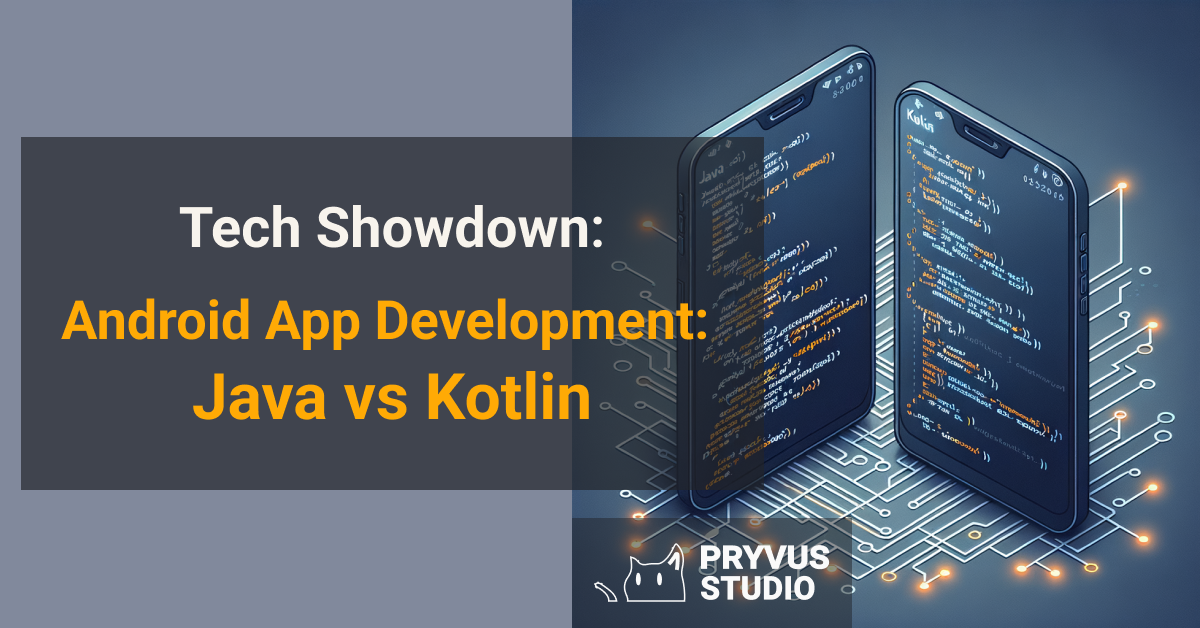Notice: Only variables should be passed by reference in /home/ploi/pryvus.com/public/wp-content/themes/pryvus/template-parts/content-post.php on line 12

The evolution of Android app development from Java to Kotlin has been a game-changer.
Kotlin offers modern features like null safety and concise syntax, challenging Java’s long-standing dominance. This shift signifies a broader move towards more efficient and effective development methodologies.
In this article, you will learn:
- Key differences between Java and Kotlin
- How Kotlin’s features enhance app development
- Choosing the right language for your project
The Evolution of Android App Development: Java to Kotlin
When it comes to Android app development, the debate between Java and Kotlin has been a hot topic. Java, known for its robustness and portability, dominated Android app development for years. However, Kotlin, introduced by JetBrains in 2011, has been making waves for its concise syntax and safety features. Let’s dive into how Android app development has evolved from Java to Kotlin.
The transition from Java to Kotlin represents a significant shift in Android app development, focusing on efficiency and safety.
Java’s long-standing position as the go-to language for Android development is challenged by Kotlin’s modern features. Kotlin offers null safety, extension functions, and coroutines, enhancing developer productivity and app performance. Despite Java’s vast ecosystem and familiarity among developers, Kotlin’s concise syntax reduces the potential for errors and streamlines the development process.
Java’s History in Android Development
- Java was officially supported for Android development in 2008.
- Its portability and robust libraries made it a popular choice among developers.
Kotlin’s Rise to Popularity
- Kotlin was introduced as an official language for Android development by Google in 2017.
- It emphasizes safety, conciseness, and interoperability with Java.
The adoption of Kotlin by the developer community has been swift, thanks to its compatibility with existing Java code and Android Studio support. Moreover, Kotlin’s approach to solving common Java pain points, such as null pointer exceptions and verbose syntax, has made it a preferred choice for new projects.
The Role of Pryvus Studio
Pryvus Studio, a custom software development company, has been at the forefront of adopting innovative solutions in web and mobile development. With expertise in both Java and Kotlin, Pryvus Studio tailors solutions to meet the unique challenges of businesses, leveraging the latest trends and technologies in WordPress and mobile app development.
Why the Shift Matters
The evolution from Java to Kotlin is not just about choosing a programming language; it’s about embracing a more efficient, safe, and modern approach to Android app development. As the industry moves forward, the benefits of Kotlin become increasingly clear, making it an essential tool for developers looking to build high-quality, performant apps.
Comparing Java and Kotlin: Performance, Syntax, and Community Support
When diving into the tech showdown between Java and Kotlin for Android app development, it’s crucial to dissect the elements of performance, syntax, and community support. These factors play a pivotal role in deciding which language suits your project best.
The choice between Java and Kotlin significantly impacts app performance, developer efficiency, and community engagement.

Performance: Both Java and Kotlin run on the JVM (Java Virtual Machine), ensuring a level of performance robustness. However, Kotlin offers more efficient syntax, which can lead to faster code compilation. Kotlin’s support for inline functions, for instance, reduces overhead during runtime.
Syntax: Kotlin’s syntax is more concise and expressive compared to Java. This not only makes the code cleaner but also reduces the chance for errors. For beginners and seasoned developers alike, Kotlin’s readability and simplicity offer a smoother development process.
Community Support: The Android development community has warmly embraced Kotlin. Its popularity surge means extensive documentation, tutorials, and forums are available, making it easier for developers to find solutions and share insights. Java, while having a vast and established community, is seeing a gradual shift towards Kotlin due to its modern features and capabilities.
Real-world applications demonstrate Kotlin’s advantages over Java in terms of development speed and app maintenance. Companies like Pryvus Studio have observed these benefits firsthand, integrating Kotlin to deliver innovative and efficient mobile solutions.
In conclusion, considering performance, syntax, and community support, Kotlin presents a compelling case for modern Android app development. Its efficiency, coupled with strong community backing, makes it an attractive choice for both new projects and migrating existing ones from Java.
Real-world Applications: Java vs Kotlin in Action
When we dive into the real-world applications of Java and Kotlin, we uncover a dynamic battlefield where each language showcases its strengths. Java, known for its long-standing reputation, has powered countless Android applications over the years. Kotlin, on the other hand, brings a fresh perspective with its modern syntax and features designed to improve productivity and app quality.
Java and Kotlin serve distinct purposes in the app development arena, each proving its worth through real-world applications.
Case Studies in Efficiency and Innovation
Let’s look at examples where Java and Kotlin have been used effectively. Java’s reliability and Kotlin’s innovative features have both led to the successful launch of various applications. For instance, older, established apps like LinkedIn and Amazon have thrived on Java’s robust framework. Meanwhile, newer, trend-setting apps such as Pinterest and Uber have benefited from Kotlin’s concise syntax and safety features.
Kotlin’s Impact on Startups
Kotlin particularly shines in the startup ecosystem, where time and resources are often limited. Its efficiency and ease of use allow startups to quickly develop and launch innovative apps. This advantage is crucial in a competitive market where speed to market can determine a startup’s success or failure.
Java’s Role in Enterprise Applications
Java continues to be the backbone of many enterprise-level applications, offering unmatched stability and scalability. Its vast libraries and frameworks enable developers to tackle complex business requirements effectively. Java’s strong security features also make it a preferred choice for applications that require high levels of data protection.
Comparative Analysis: Performance and Maintenance
Performance-wise, both languages have their merits. Java’s time-tested efficiency is well-documented, but Kotlin’s syntax allows for cleaner, more readable code, which can reduce bugs and simplify maintenance. This aspect is particularly appealing to developers looking to streamline the development process and reduce long-term upkeep costs.
Ultimately, the choice between Java and Kotlin boils down to the specific needs of the project. Factors such as project size, team expertise, and the app’s intended functionality play crucial roles in this decision.
The Future of Android App Development: Embracing Kotlin
The landscape of Android app development is constantly evolving, and Kotlin is at the forefront of this transformation. With its modern syntax, powerful features, and strong support from Google, Kotlin is quickly becoming the go-to language for Android developers worldwide.
Kotlin is shaping the future of Android app development with its modern approach and comprehensive features.

Why is Kotlin gaining such traction? Firstly, its concise syntax reduces the amount of boilerplate code developers need to write, making coding faster and more enjoyable. Kotlin also offers null safety, which significantly reduces the chances of app crashes due to null pointer exceptions, a common issue in Java-based applications.
Moreover, Kotlin’s interoperability with Java means that developers can use both languages within the same project, leveraging the strengths of each. This flexibility is invaluable in complex projects that require legacy code integration or gradual migration to Kotlin.
Embracing Kotlin: A Strategic Move
Adopting Kotlin is not just about using a trendy new language; it’s a strategic move for businesses looking to future-proof their Android apps. Kotlin’s compatibility with existing Java code and its support for modern programming practices make it a smart choice for both new projects and those considering a transition from Java.
Statistics and real-world examples underscore Kotlin’s growing dominance. According to recent surveys, a significant percentage of professional Android developers now use Kotlin, and major companies have migrated their apps to Kotlin, citing benefits such as reduced development time and fewer app crashes.
In conclusion, the shift towards Kotlin is more than a trend; it’s a reflection of the language’s ability to meet the demands of modern Android app development. For businesses and developers aiming to stay at the cutting edge, embracing Kotlin is not just advisable; it’s essential.
Making the Right Choice for Your Project
Choosing between Java and Kotlin for your Android app development project can feel like a big decision. But don’t sweat it! It’s all about matching your project’s needs with the strengths of each language.
Let’s break it down:
- Java is your go-to for large-scale, enterprise-level projects. Its robustness and reliability have been proven over the years.
- Kotlin, on the other hand, shines in projects that prioritize modern features, such as null safety and concise syntax. It’s perfect for startups and innovative applications.
Think about your project’s size, the expertise of your team, and your functionality goals. Each language has its place, and the choice depends on these factors. Remember, Kotlin’s interoperability with Java means you’re not locked into one option; you can leverage the strengths of both!
Still on the fence? Pryvus Studio is here to help. Our team of experts specializes in both Java and Kotlin, ensuring your project is in good hands. Let’s make your app development journey a breeze. Reach out today!


